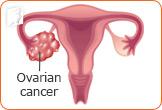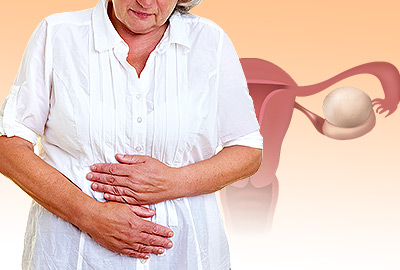Menopause and postmenopause can be alarming for women who don't know what to expect. With hormones and emotions running wild it can be difficult to deal with all your body's changes in addition to the increased risk of contracting more serious conditions.

Although the increased risk of ovarian cancer is one that is particularly well known to affect women during menopause and postmenopause, it should also be remembered that your risk of contracting any cancer increases with age. Continue reading to find out what ovarian cancer is, what the signs are, and why it is thought that the risk of ovarian cancer increases throughout postmenopause.
What Is Ovarian Cancer?
Ovarian cancer is a malignant tumor that can develop in one or both of a woman's ovaries. The cancer is the fourth leading cause of cancer caused death among women. Most commonly it is found occurring in women who are older than 50. In fact, according to the American Cancer Society (ACS), over half of those diagnosed with ovarian cancer are over the age of 63.

When found in its earlier stages, ovarian cancer treatment has a success rate of up to 90 to 95% of cases. Unfortunately, early-stage ovarian cancer is hard to detect because it presents little or no symptoms. Many cases of ovarian cancer are found after the cancer has spread to other organs. In these cases, the cancer is much more difficult to treat and cure.
In order to detect ovarian cancer during its first two stages, middle aged women should visit their doctors at least once a year and undergo routine screening tests like Papanicoulau (pap smear) and transvaginal ultrasounds.
The Cause of Ovarian Cancer Is Not Yet Known
There are many possible factors involved in the onset of ovarian cancer, and ongoing research is continuously discovering new links between this disease and other factors. This is why it is not always possible to point out one particular cause. However, you have an increased risk of ovarian cancer if you:
- Have a family history of ovarian cancer
- Have never been pregnant or gave birth for the first time after the age of 30.
- Are overweight and over the age of 50, since the likelihood of developing ovarian cancer increases as you age.
Signs of Ovarian Cancer
In its early stages, ovarian cancer has few symptoms. The first sign of ovarian cancer is usually an enlarged ovary. The ovaries are located deep within the pelvic cavity, so swelling may go unnoticed until it becomes more advanced. Symptoms of more advanced ovarian cancer include:

- Swollen abdomen (caused by the build-up of fluids produced by the tumor)
- Lower abdominal and leg pain
- Sudden weight loss or gain
- Change in bowel or bladder function
- Nausea
- Swelling in the legs
If you want to learn more about postmenopause, click on the link below to find out about postmenopause treatments.
Sources
- BMJ Group. "Menopause: What is it?" Patient Leaflet. 2007.
- Hopkins, Virginia. Lee, John R. M.D. What Your Doctor May Not Tell You About Menopause. New York: Warner Books Inc., 1996.
- Love, Susan M.D. Menopause and Hormone Book. New York: Three Rivers Press, 2003.
- Martin, Raquel. The Estrogen Alternative. Rochester, VT: Healing Arts Press, 2000.



